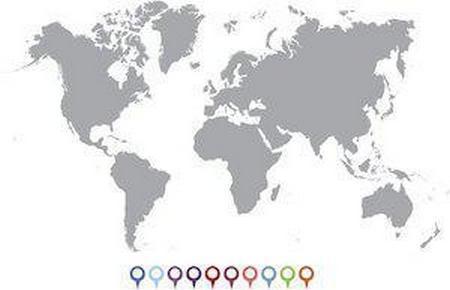Recent Blog Posts
Diversity Immigrant Visa Lottery
 The Immigration Act of 1990 had a huge impact on immigration law in the United States. It revised policies regarding deportation, authorized temporary protected status to non-citizens of certain countries, changed the Visa Waiver Program, and – maybe most importantly – established the Diversity Immigrant Visa Program.
The Immigration Act of 1990 had a huge impact on immigration law in the United States. It revised policies regarding deportation, authorized temporary protected status to non-citizens of certain countries, changed the Visa Waiver Program, and – maybe most importantly – established the Diversity Immigrant Visa Program.
The Diversity Visa Lottery Program makes about 55,000 permanent resident visas available every year to natives of countries who have low rates of immigration to the United States. The lottery is administered by the U.S. Department of State. From an operational standpoint, people from most countries are allowed to apply for the visa program. The list of non-qualifying countries is much shorter, and as of last year included people from Brazil, Bangladesh, Mexico, Canada, and Vietnam. Non-qualifying countries can change year to year, depending on immigration rates. For example, Nigerians were added to the non-qualifying list last year.
In addition to being from a qualifying country, applicants must also either have a high school diploma or its equivalent, or have at least two year of job experience within the last 5 years. Although having a job already set up in the United States is not a requirement, the individual must show that he or she has a means of support.
The Application Process
Unfortunately, the application much different than the lottery we play in the U.S. to win money. First and foremost, the application process is free. If an applicant is asked to pay a fee for the application through a third party or asked to pay a fee for special help, the third party is probably running a scam. An applicant can apply once per year, and must submit an application called a DV-2015. The application period is usually in the fall of each year. More information on how to fill out the DV-2015 and the types of paper work that are needed can be found here.
Finally, even if an applicant “wins” the lottery, it does not necessarily mean that the applicant will actually receive a visa. The State Department typically announces more winners than there are spots, so applicants must quickly get in touch with the State Department and USCIS to follow up about their application. If the applicant does not do this, he or she may be out of luck, as the U.S. could run out of cards for that year.
If you happen to win the Diversity Immigrant Visa Lottery, or if you know someone who has, you should contact an experienced DuPage immigration attorney immediately. Working with USCIS and the State Department, and showing that the applicant should not be disqualified is a complex process. Mevorah & Giglio Law Offices can help navigate this process with applicants to help ensure the proper outcome.
One Woman’s Story Highlights the Pitfalls of Marrying Young
 In medieval England, and at other points in world history, marriage was less an institution to promote family values than it was a tool used by the aristocracy to consolidate power. Accordingly, it was not uncommon for women to be wed soon after they were capable of bearing children, often in their early teens. In modern society, this has changed drastically. The goals of marriage have been updated to such things as starting a family and building a life with a treasured partner. The average age of first marriage has also changed significantly.
In medieval England, and at other points in world history, marriage was less an institution to promote family values than it was a tool used by the aristocracy to consolidate power. Accordingly, it was not uncommon for women to be wed soon after they were capable of bearing children, often in their early teens. In modern society, this has changed drastically. The goals of marriage have been updated to such things as starting a family and building a life with a treasured partner. The average age of first marriage has also changed significantly.
According to the US Census, the median age of women marrying for the first time was 26.1 years old as of 2010. This is in stark contrast to the perceived conservative era of the 1950s, when the median age was 20.3. With women increasingly being educated and working high paying jobs, there is opportunity for women to survive without relying upon a husband to earn a paycheck.
Continued Winter Weather Proves Hazardous on Roadways
Warning: stripos(): Offset not contained in string in /home/ocvaws/public_html/system-joomla-shared-core/components/com_easyblog/easyblog.php on line 6
Safety Training for Illinois' Teen Drivers
The incidence of accidents involving new teen drivers is undeniable. Their inexperience, coupled with their newfound independence, often results in distractions and mistakes being made while operating a vehicle. While some resulting accidents involve negligence, others involve poor decision making on the part of the teen driver. Recently, teens in Marion, Illinois took part in a program aimed at providing safety training to new drivers.
Williamson County Traffic Safety Day
According to an article recently published by The Southern Illinoisian, February 25th marked the sixth annual Williamson County Traffic Safety Day in the City of Marion. One of the most popular presentations featured during the day was "Street Smart," given by Florida SAFE, which is a firefighter/paramedic group from Dade County, Florida. About 120 students from Marion High School were in attendance at the morning presentation.
Deferred Action for Childhood Arrivals
 While immigration advocates are pressing President Obama to halt all deportations until an immigration reform bill can be passed, many immigrants that do not have legal status already have an opportunity to receive deferred status in the United States through the Deferred Action for Child Arrivals (DACA) remedy. President Obama established this rule two years ago, and it allows immigrants who arrived in the United States as children to apply for a two-year deportation protected status, in addition to a work permit.
While immigration advocates are pressing President Obama to halt all deportations until an immigration reform bill can be passed, many immigrants that do not have legal status already have an opportunity to receive deferred status in the United States through the Deferred Action for Child Arrivals (DACA) remedy. President Obama established this rule two years ago, and it allows immigrants who arrived in the United States as children to apply for a two-year deportation protected status, in addition to a work permit.
Obtaining deferred action does not bring about permanent residency or citizenship. It simply stops immigration authorities from deporting an individual who would otherwise be removable. Still, it can serve as an important tool if you or someone you know would like to stay legally in the United States and have the opportunity to work. Below is a brief explanation on who may apply for deferred action status.
Who Can Apply?
In accordance with the guidelines set forth by U.S. Citizenship and Immigration Services, an immigrant can apply for deferred status if he or she was younger than 31 years old on June 15, 2012, was younger than age 16 when he or she arrived in the United States to live, and lived in the United States since June 15, 2007. The individual also had to have been physically present in the U.S. on June 15, 2012, and he or she must be in the United States during the application process.
Limitations
In addition to the above criteria, there are some limitations on the types of people that can apply as well. If the person applying for deferment has been convicted of a felony or certain types of ‘significant misdemeanors,’ he or she may not be eligible to apply.
‘Significant misdemeanor’ is not a term that is typically used in immigration law. USCIS defines a significant misdemeanor as one for which the maximum term of imprisonment is less than a year, but greater than five days and either 1) was a domestic violence, burglary, use of firearm, drug trafficking or DUI offense, or 2) was an offense in which the individual was sentenced to more than 90 days in custody. If either of these two categories is fulfilled, then that person cannot apply for the deferral.
Remember that DACA is still a relatively new policy in a time in which immigration law is becoming more and more open to change. While USCIS has stated that after the two-year time limit has passed individuals can renew for another two years, no one yet knows what effect immigration reform will have on this policy.
If you or someone you know in Illinois would like to know more information about DACA or other options for legally residing and working in the United States, contact Mevorah & Giglio Law Offices today.
Same-Sex Marriages Do Not Yet Mean Equality, Especially When Traveling
 Much has been written about the landmark law passed in Illinois last year legalizing same-sex marriages. Many have weighed in on the subject, be they opposed (like the Catholic Church), in favor (like the American Civil Liberties Union), or blasé (like the US Supreme Court, if the satirical newspaper The Onion is to be believed).
Much has been written about the landmark law passed in Illinois last year legalizing same-sex marriages. Many have weighed in on the subject, be they opposed (like the Catholic Church), in favor (like the American Civil Liberties Union), or blasé (like the US Supreme Court, if the satirical newspaper The Onion is to be believed).
However one feels about it, the law goes into effect statewide on June 1st. On that date, same-sex couples can apply for marriage licenses so that their marriages can receive the same benefits, rights, and responsibilities as traditional, opposite-sex marriages. In fact, for some Illinois residents, including those in Cook and Champaign counties, clerk’s offices have already begun giving out marriage licenses to same-sex couples. This is a result of a federal judge’s recent decision striking down the old state law as violating the U.S. Constitution.
Distracted Driving by Law Enforcement
In the beginning of the year, a new law went into effect in Illinois banning the hand-held use of cell phones while driving. The law is meant to curb distracted driving in the state, but does allow for some exceptions. One such exception is that the law does not apply to police officers, even though they face many more potential distractions while behind the wheel. As one recent article points out, this type of situation resulted in a fatal accident on the roadways of Illinois a few years ago.
The Accident
The day after Thanksgiving in 2007, two sisters were driving from their mother's to their father's home. Having not heard from the girls since the morning when they left, and being unable to reach them, their mother was getting worried. She decided to drive the route they would have taken, but just before she left, the Illinois state police arrived at her home to confirm her worst fear.
New Inadmissibility Directive for DUIs
U.S. Citizenship and Immigration Services recently released new guidance on health-related grounds for inadmissibility, which calls for stricter standards toward immigrants who have been arrested for driving under the influence. Before providing details on the new policy, however, an explanation of inadmissibility is given.
Inadmissibility in Immigration
For those who are not currently residing in the United States, and who wish to enter, they must be inspected to be ‘admitted’. Individuals will be examined by a Customs and Border Patrol officer at the immigrant’s place of entry to see if they fulfill the criteria set out by the Immigration and Nationality Act, and to ensure that they are not found inadmissible through a number of different grounds. A non-U.S. citizen can be denied admission into the United States or denied an adjustment of status to a lawful permanent resident if that person is found to be within one of USCIS’s grounds for inadmissibility.
Grounds for inadmissibility apply to non-citizens who have not been admitted into the U.S. People who have not been admitted into the United States include those who are seeking permission to enter the U.S. from an airport or seaport, people who entered the United States illegally, those who are applying for an adjustment of status to become a lawful permanent resident, and, in some cases, people who have committed some negative act within the United States, traveled abroad, and are now seeking re-entry.
Grounds for Inadmissibility
There are a number of ways one can be found inadmissible into the United States. These include health-related grounds, criminal grounds, national security grounds, those who have a record of undocumented entry, and a final classification called ‘miscellaneous,’ which includes people coming to the United States for polygamy, and those who have renounced their U.S. citizenship for tax purposes. You can find more details on grounds for inadmissibility here. For the purposes of this entry, however, we will focus on the health-related grounds for inadmissibility.
Health-Related Grounds for Inadmissibility
People who have a communicable disease that may pose a health risk to the public can be deemed inadmissible. Diseases that will prevent an immigrant from entering the United States include syphilis, cholera, and smallpox. All of the diseases that trigger inadmissibility are determined by the Secretary of Health and Human Services.
Through a USCIS policy change released earlier this week, however, if a non-citizen has an arrest for one DUI within the past 5 years, he or she will be tested for alcohol abuse disorders. If it is found that the person has an alcohol abuse disorder and that harmful behavior associated with the disorder is likely to recur, he or she may be deemed inadmissible.
This is a nuanced, but important change to USCIS policy that may affect many people. If you have any questions on inadmissibility or entry into the United States, contact Mevorah & Giglio Law Offices today.
New Illinois Traffic Law: A Follow-Up
Warning: stripos(): Offset not contained in string in /home/ocvaws/public_html/system-joomla-shared-core/components/com_easyblog/easyblog.php on line 6
A Brief Look at the (Surprisingly) Brief History of Divorce
 Depending on whom you ask, divorce is both a modern contrivance and an ancient right. In Muslim and Jewish religious law, a divorce is fairly easy to acquire for the husband. If a wife wants a divorce, it is more difficult. However, in Western Civilization, dominated by Christianity in general and (at least in Europe) Roman Catholicism specifically, divorce was (and remains) forbidden. Since most of our law derives from England, why is divorce as prevalent in the US as it is? Why do nearly half of first marriages end in divorce in America?
Depending on whom you ask, divorce is both a modern contrivance and an ancient right. In Muslim and Jewish religious law, a divorce is fairly easy to acquire for the husband. If a wife wants a divorce, it is more difficult. However, in Western Civilization, dominated by Christianity in general and (at least in Europe) Roman Catholicism specifically, divorce was (and remains) forbidden. Since most of our law derives from England, why is divorce as prevalent in the US as it is? Why do nearly half of first marriages end in divorce in America?
According to an article written by Amanda Foreman and published in the latest issue of Smithsonian Magazine, women’s liberation gave rise to the notion of equitable divorce that is more freely available. But to state blankly that the perceived crisis in marriage is the fault of women is to misunderstand the history of divorce.
 English,
English,
 Spanish,
Spanish,
 Polish,
Polish,
 Urdu
Urdu












 Make a Payment
Make a Payment



